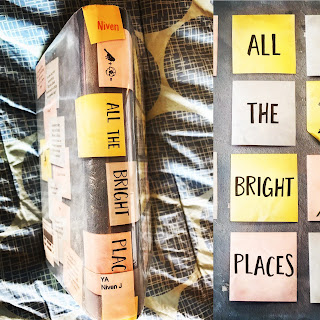Standout Book: All The Bright Places
 |
When I picked up All The Brightest Places, I wasn’t sure what to expect. I nearly skipped putting it on my reading list, but I’m glad I decided to grab it. This story has become one of my favorite books because it checks off all the boxes in my top three important categories- plot, characters, and overall writing quality. I’m usually satisfied if a book can nail two.
The basis of the storyline is that Violet and Finch meet on top of the school bell tower. They are both on the edge because of traumatic issues that consume their lives. While neither of them are serious about jumping that day, it opens a dialogue that grows into friendship over the course of a school project that requires the pair to see the highlights of Indiana. Through the silly stops and random places, they get to know each other, and, through that, start to heal.
So, Box 1- the Characters:
One word. AMAZING! The book is told in split POV between Violet and Finch (more on that later). With Finch, the reader can feel his emotions and truly see the world through his eyes. He’s a bit sarcastic, a dreamer, an outsider who owns who he is, and unstable. And these traits manifest in many different ways over the course of the book. Another intriguing facet of Finch is that he both despises and is fully attached to labels. While he creates almost characters for himself to play that corresponds with his style of dress and subsequently labels them (Slacker Finch, British Finch…), he refuses to accept a label for any mental illness he might have. He feels like a real, living, breathing person who admits to not having it all figured out, and he’s okay with that. His honesty and his approach to being an outsider makes him one of my favorite characters.
Violet is also great. She realistically struggles with piecing her life back together after the loss of her older sister in a car crash Violet survives. She brings her own unique and relatable perspective to the table and is easy to identify with as well. I also identified with how she counted down the days till she thought her life would begin. She struggled with living in the present, and watching her learn helped me.
It is also worth mentioning that the supporting cast of characters are all well rounded and feel complete.
Box 2- The Plot:
Wow. Niven is able to wind the story of these two characters beautifully and realistically. Every step forward they take is facilitated properly and often propelled by a stop in their Wanderings project. Each places teaches a different lesson or cements the growth of a common theme. Finch learns from Violet that there is real happiness out there, and, for a minute, the thought of ending it all passes out of his head. He doesn't mention someone who has done it or a method to do it. As for Violet, she learns to start living in the present. He pushes her comfort zone in the most healing, positive way. Finch says things that no one else will because he doesn't treat her with the kid gloves everyone else wears. We see in the chapter headings that Violet stops counting the days until she leaves her tiny town and starts living in the present.
While the ending, which even though I saw it coming was still shocking, I wish it didn't have to end that way. Though it says something that it remained in my good graces even when it didn't play out the way I wanted. And that is because it had a reason and a conclusion. Niven did it with purpose and created a satisfying final set of chapters after the fact. For some reason, I just couldn't bring myself to be mad- though I cried quite a bit.
Box 3: The Writing:
If the wheels of a books don't fall off at plot, this is usually where it goes down, but, for Niven, she soars. The writing is true to each voice. Violet and Finch sound like two completely different people, and I knew who was narrating without looking at the chapter heading. It also counts for something that both voices telling the story were engaging. (I usually find myself flipping ahead to see when my favorite narrator will make an appearance again, but not this time).
The way the words fall seems effortless yet not easy in a boring way. She paints the perfect picture in every scene giving just enough information without inundating the reader. This way each person develops the picture organically like getting to know a real person.
Conclusion:
So, clearly, I loved this book. That’s why I’ve decided to feature it for this week’s book stack winner. It was a story that reached a depth that few books scratch. The story struck a chord that made you cry when tragedy happens in a way that you only do if the author has managed to invest you in it. I cared about these people. I saw myself in elements of each of the narrators. This is a must read! (Though wait to read the end till you are alone in your room with a box of tissues!)



Comments
Post a Comment